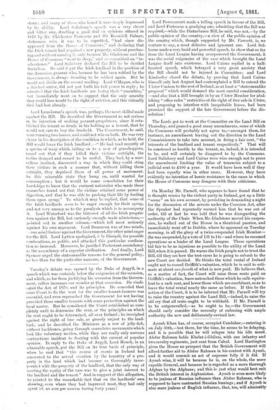Tuesday's debate was opened by the Duke of Argyll, in
a 'speech which was certainly below the exigencies of the occasion, and which, so far from justifying his secession from the Govern. ment, rather increases our wonder at that secession. He vindi- ',ate(' the Act of 1870, and its principles. He conceded that some Court to fix the rent for the smaller tenant-farmers was essential, and even reproached the Government for not having provided these smaller tenants with some protection against the local usurer. But he considered the Court established as com- pletely unfit to determine the rent, or the principles on which the rent ought to be determined, all over Ireland ; he inveighed against the right of free sale, as grossly unjust to the land- lord; and he described the Ministers as a row of jelly-fish, without backbones, going through convulsive movements which look like voluntary motion, while they are really only nervous contractions incident to floating with the current of popular opinion. In reply to the Duke of Argyll, Lord Monck, in an admirable speech, put the Bill on its true basis of principle, when he said that " the course of events in Ireland had amounted to the actual creation by the tenantry of a pro- perty in the land which had become so thoroughly incor- porated with the property of the landlord, that the-only way of meeting the equity of the case was to give a joint interest to the landlord and the tenant." And in support of this allegation, he pointed to the remarkable fact that on the landlords' own showing, even where they had improved most, they had only spent .5d. an acre per annum during forty years !






























 Previous page
Previous page